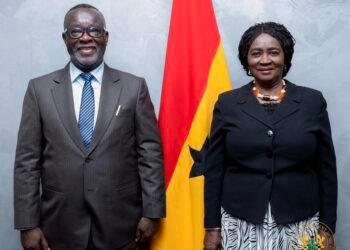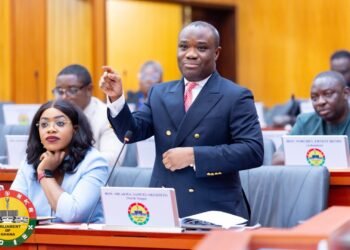A fresh round of political sparring has emerged following the United States’ decision to revise its visa reciprocity arrangement with Ghana.
The move, which now restricts B-class non-immigrant visas—including business and tourism travel—to a single entry valid for only three months, has been met with fierce criticism from New Patriotic Party (NPP) Communicator Dennis Miracles Aboagye.
According to Aboagye, the root of the issue lies in Ghana’s own prior decision to shorten the duration of visas issued to American citizens.
Formerly, U.S. nationals could obtain five-year multiple-entry visas to Ghana, but this was recently changed to a three-month single-entry policy by the Ministry of Foreign Affairs.
Aboagye argued that the United States is simply responding in kind, using what he described as a principle of reciprocity.
“Ignore the Government’s Communications Minister [Felix Kwaye Ofosu]. He’s not being entirely truthful with the facts on the US Visa sanctions.
“This 3-month single-entry Visa is all the fault of our Foreign Minister and his decisions and nothing more. IT IS NOT TRUE that it’s because of our students who overstay. That’s false.”
Dennis Miracles Aboagye
Aboagye clarified that although Ghana is listed among 36 countries with high visa overstay rates, several others—such as Gabon, Senegal, Egypt, Djibouti, Liberia, and Saint Kitts and Nevis—remain unaffected by similar sanctions.
To him, this underscores that the U.S. is not penalizing overstay violators across the board, but specifically responding to how Ghana altered its visa terms for Americans.
“The US Government adjusts its Visa Policies based on certain key reasons, chief among these reasons is how its citizens are also treated by other countries, which is referred to as RECIPROCITY.”
Dennis Miracles Aboagye

Aboagye maintained that Ghana is facing the direct consequences of its own recent diplomatic decisions. He emphasized that resolving the current visa standoff requires a shift in strategy rather than deflecting blame or relying on public relations tactics.
In his view, the Foreign Minister, Hon. Samuel Okudzeto Ablakwa, should adopt a more restrained and thoughtful approach to international diplomacy—revisiting Ghana’s previous visa policy toward the U.S. to help restore mutual terms.
He further criticized what he sees as the government’s poor handling of the situation, arguing that officials have failed to communicate openly with the public and have instead obscured the real cause behind the U.S. decision.
For Aboagye, this lack of transparency reflects a deeper issue in the administration’s diplomatic engagement.
Nigeria’s Contrast and Ghana’s Misstep Amid U.S Visa Policy
Dennis Aboagye further highlighted Nigeria’s approach to a similar diplomatic challenge as a more responsible and strategic example.
While both Ghana and Nigeria experienced reduced visa privileges from the United States, he pointed out that Nigeria promptly recognized the move as an act of reciprocity and formally appealed to the U.S. for a reassessment, viewing the change as excessive.

“Our Government, which should act in such a swift manner, is here arguing with its citizens and attempting to cover up the fact that it is a RECIPROCITY issue. Meanwhile, the thing is written in Black & white by the U.S government for everyone to read.”
Dennis Miracles Aboagye
Aboagye asserted that Ghana’s leadership could have pursued a similar diplomatic path, but instead resorted to denial.
Beyond the rhetoric, Aboagye warned that the shortened visa terms carry significant economic and emotional burdens for Ghanaians.
He described the new limitations as a direct blow to individuals and families who depend on travel flexibility for work, education, and tourism.
He concluded with a firm stance, asserting that the only viable path forward for Ghana is to reinstate the 5-year multiple-entry visa policy for American citizens.

Doing so, he emphasized, would pave the way for the United States to reciprocate with the same visa privileges for Ghanaians. “This has nothing to do with sovereignty; it has everything to do with common sense. I treat you how you treat me.”
Aboagye urged government officials to adopt a more emotionally intelligent and strategic posture in foreign affairs, reminding them that “This is diplomacy, not Propaganda!”
As public debate continues and pressure mounts, it remains to be seen whether the Ministry of Foreign Affairs will revise its policy and take steps to restore the previous visa terms, which many now believe are crucial for maintaining healthy bilateral relations between Ghana and the United States.
READ ALSO: Ghana Moves to Ban Raw Shea Nut Exports by 2026 to Boost Local Value Addition























